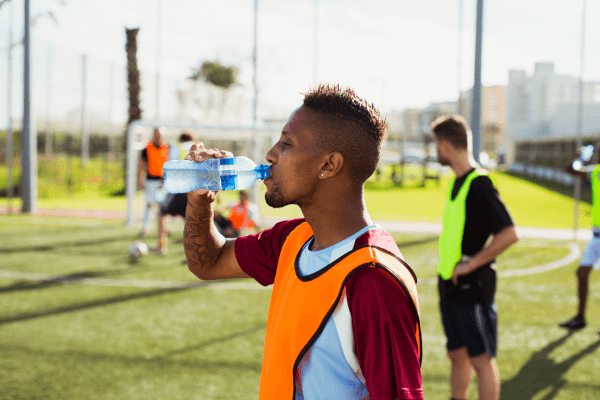Performance on the pitch does not depend solely on training or talent.
Nutrition plays a key role in a footballer's ability to perform at his best, speed up recovery and prevent injury.
In this article, we'll look at why proper nutrition is essential for footballers and how it can transform your game.
Summary
The basic principles of a diet for footballers
When it comes to nutrition, every footballer needs to ensure that his diet supports his physical goals and energy requirements. The pillars of a good diet are :
- Balance: A varied diet that includes all the food groups.
- Quality: Fresh, nutritionally rich ingredients.
- Individual adaptation: Adjust portions and types of food to suit the age, level of training and specific needs of the player.
For example, a regime for a professional player may be different from that for a young player in training due to differences in physical workloads and fitness targets.
The role of macronutrients in football performance
Macronutrients are essential for feeding footballers. Each category plays a specific role:
Carbohydrates: the main fuel
Carbohydrates are the main source of energy for footballers, particularly during intensive training and matches. They guarantee:
- Sustainable energy: Complex carbohydrates such as wholegrain rice, wholegrain pasta and sweet potatoes release their energy slowly.
- Optimum performance: Replenishing glycogen reserves after a match is crucial.
Tip: Including a portion of complex carbohydrates 2 to 3 hours before a match can make the difference between a performance peak and premature fatigue.
Proteins: for repair and recovery
Proteins are crucial for repairing muscle fibres after intense effort. Ideal sources :
- Lean meat (chicken, turkey)
- Dairy products (yoghurts, low-fat cheeses)
- Plant-based alternatives (tofu, lentils)
🔑 Practical advice Eating a source of protein within 30 minutes of intensive training can speed up recovery.
Lipids: energy and health
Although often misunderstood, lipids play a key role in football:
- They provide long-lasting energy for low-intensity workouts.
- Essential fatty acids (omega-3) reduce inflammation and support cardiovascular health.
Choose sources such as avocado, nuts and oily fish (salmon, mackerel).
The importance of micronutrients in injury prevention
Vitamins and minerals, although necessary in small quantities, have a major influence on performance and recovery:
- Calcium and vitamin D: Crucial for bone health.
- Magnesium: Reduces muscle cramps.
- Iron: Optimises oxygen transport in the blood.
Eating foods rich in micronutrients such as green vegetables, red fruit and wholegrain cereals is essential.
Hydration: an ally for performance and recovery
Dehydration can reduce your performance by up to 30 %. Here's why drinking water (and electrolytes) is fundamental:
- Prevents fatigue and cramps.
- Maintains optimum body temperature.
- Helps you concentrate during matches.
🔑 Practical advice Drink small quantities every 15 to 20 minutes during your training.

Meal planning for optimum performance
Good nutrition isn't just about what you eat, it's also about when you eat. Here's an example of a game day meal plan:
3 hours before a match :
- Wholemeal pasta with grilled chicken.
- A banana for potassium.
30 minutes before the match :
- An energy bar or fruit.
After the match (critical recovery period) :
- Protein shaker or Greek yoghurt with honey.
- A handful of nuts.
Common mistakes in football nutrition
Even the most assiduous players can make nutritional mistakes. Here are some common pitfalls and how to avoid them:
- Skipping meals: : This can lead to a lack of energy and a drop in performance.
- Too much junk food: Empty your cupboards of crisps and fizzy drinks. These foods provide little or no nutrients.
- Not enough sleep: Nutrition goes hand in hand with sleep to optimise recovery.
Solution: Plan your meals better, avoid ultra-processed foods and maintain a healthy lifestyle.
Conclusion
Make nutrition part of your daily routine to make progress on the pitch.
Food is much more than just a supplement for footballers.
It's an integral part of performance, recovery and mindset.
By investing in quality nutrition, you maximise your chances of success, whether you're a future professional or an enthusiast wanting to give your best.
Want to find out more? Discover our other blog posts on sporting performance, or what are the 7 essential qualities to succeed as a footballer.

